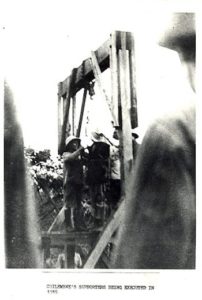
Gallows
*On this date in 1915, The Chilembwe uprising occurred. This rebellion was against British colonial rule in Nyasaland (modern-day Malawi).
John Chilembwe, a Black African Baptist minister, led it. Based around his Church in the village of Mbombwe in the southeast of the protectorate, the revolt leaders were mainly from an emerging Black middle class. They were motivated by grievances against the white colonial system, including forced labor, racial discrimination, and new demands imposed on the indigenous population following the outbreak of World War I.
The revolt broke out when rebels, incited by Chilembwe, attacked the headquarters of the A. L. Bruce Plantation at Magomero and killed three white settlers. A largely unsuccessful attack on a weapons store in Blantyre followed during the night. By morning, the colonial authorities had mobilized the white settler militia and redeployed regular military units from the King's African Rifles (KAR). After a failed attack by government troops on Mbombwe on January 25th, the rebels attacked a Christian mission at Nguludi and burned it down.
The KAR and militia took Mbombwe without encountering resistance on January 26th. Many rebels, including Chilembwe, fled towards Portuguese East Africa (modern Mozambique), hoping to reach safety there, but many were captured. About 40 rebels were executed in the revolt's aftermath, and 300 were imprisoned; Chilembwe was shot dead by a police patrol near the border on February 3rd. Although the rebellion did not achieve lasting success, it is commonly cited as a watershed moment in Malawian history. The uprising had lasting effects on the British administration system in Nyasaland, and some reform was enacted in its aftermath.
After World War II, the growing Malawian nationalist movement reignited interest in the Chilembwe revolt. After Malawi's independence in 1964, it became celebrated as a key moment in the nation's history. Chilembwe's memory, which remains prominent in the collective national consciousness, has often been invoked in symbolism and rhetoric by Malawian politicians. Today, the uprising is celebrated annually, and Chilembwe himself is considered a national hero.